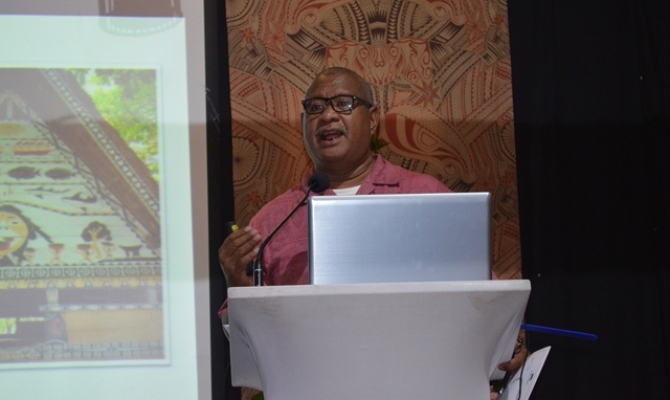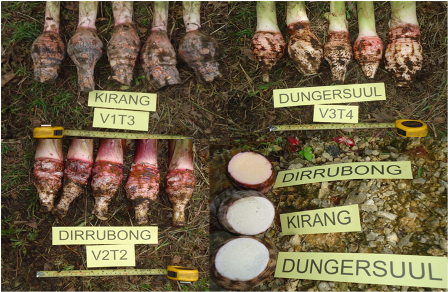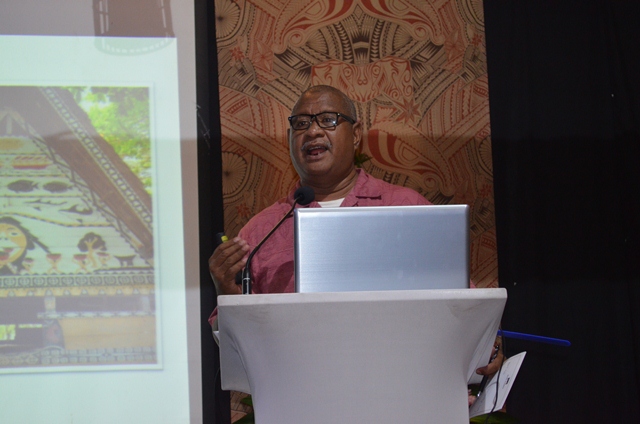
13 May 2015 Apia Samoa PCCR - Saving a cultural icon that women cultivate is one of the key outcomes of a national consultation process in the northern Pacific island state of Palau, the annual Pacific Climate Change Roundtable currently underway in Samoa has heard.
The icon is taro, traditionally grown by women in swampy patches on the lowlands of the larger islands in Palau. Three years ago, taro gardens were under siege from limited freshwater flow and increasing saltwater penetration.
"Using traditional knowledge and good scientific practices, our team was able to isolate the causes of the problem," says Joe Aitaro of Palau.
"Data collected over trials we conducted on the main island of Babeldaob indicate that the age old practice of slash and burn up in the uplands were in actual fact threatening the very survival of taro patches downstream."
Aitaro explains that through saltwater testing downstream and soil measurement upstreams, his team was able to conclude that slash and burn in the uplands led to increasing sedimentation of streams. This in turns block the flow of freshwater to taro patches downstream, allowing as a result more saltwater penetration that threatened the very survival of a crop that is not only a good economical crop but one that is a symbol of cultural wealth and prestige in Palau.
As part of the exercise, Aitaro and his team also scout for a saltwater resistant variety of taro. They found one 'in-house,' in one of the small, atoll islands in Palau's southwest. Introducing this variety in taro patches in Babeldaob, and discouraging the use of slash and burn upland, the future of taro cultivation is assured.
"All this work contributed to the formulation of our national policy on food security," says Aitaro. "Under SPREP's Pacific Adaptation to Climate Change (PACC) project, the Palau Community College led the work in this area, conducting trials within taro growing communities in Babeldaob and compiling all the data.
"Our proposed national policy on food security is now before the Palau Congress for endorsement. We're hoping to have Congress' stamp of approval by June."
From an exercise to save Palau's cultural food icon to a national policy on food security, Aitaro told delegates at Samoa's Pacific Climate Change Roundtable this week that their work has been all encompassing.
The country's health department got roped in, promoting the nutritional value of taro as opposed to imported staples like rice. Since meals are provided by the state in Palau's schools, the department of education has joined the project too with the commitment to serve taro as well as cassava in school meals.
"With all these ideas incorporated in our proposed national policy on food security, the plan is to come up with a sustainable financial mechanism that will ensure the perpetual cultivation of taro, reliance on good agricultural practices, promotion of good nutrition and reducing dependency on imported foods.
"We're hoping this fund will be financed both through internal as well as external sources," adds Aitaro – Samisoni Pareti
The Pacific Climate Change Roundtable is held from 12 – 14 May in Apia, Samoa. The event in its current format has been coordinated by SPREP with guidance from a steering committee.
The PCCR has been made possible with support from the Government of Switzerland, Government of Samoa, Government of Australia, European Union, GIZ, United Nations Development Program (UNDP), Secretariat of the Pacific Community (SPC), Pacific Islands Forum Secretariat (PIFS), University of the South Pacific (USP) and the Pacific Council of Churches (PCC). Additional funding support was provided by the EU-GIZ Adapting to Climate Change and Sustainable Energy (ACSE) Programme, and Climate Analytics through its High Level Support Mechanism (HLSM) project as well as the United States Agency for International Development (USAID). #pccr2015
